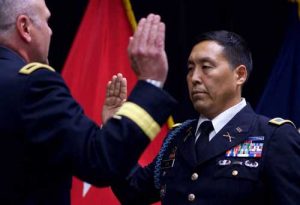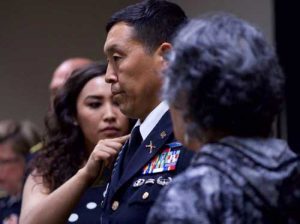
The quiet students sitting in the back row remind Col. Wayne Don of himself the most.
They’re why he returns every summer to speak with students at the University of Alaska Fairbanks Rural Alaska Honors Institute. The 1989 RAHI alumnus shares how he got out of his comfort zone by asking questions in his criminal justice classes. While attending RAHI, Don decided that even though he was shy, he would become a public speaker.
“I tell them how RAHI gave me the focus and determination to keep trying,” said Don, who graduated from UAF with a bachelor’s degree in criminal justice and a master’s of business administration. “Personally and professionally, everyone will fail at something, so it’s important to learn resiliency and realize that struggle and failure are not the end of the world.”
Facing challenges head-on is a lesson he learned at RAHI, and it’s also one of his secrets to successfully walking in different worlds as a tribal and business leader, Alaska Army National Guard officer and international ambassador. In 2011, Don was honored with the prestigious Marshall Memorial Fellowship, which sent him on a 23-day tour of five European countries and meetings with world leaders.
Don helped kick off the Alaska Federation of Natives Convention with his co-keynote speaker, Sgt. Jody Potts, director of Tanana Chiefs Conference’s village public safety officer program. The annual convention draws about 4,000 attendees, making it the largest gathering of indigenous people in the United States. This year’s theme is “Strength in Unity: Leadership — Partnerships — Social Justice.”

For Don, it was an opportunity to share the stories of the Alaska Territorial Guard, which was organized after the bombing of Pearl Harbor and the Japanese occupation of the Aleutian Islands during World War II. The volunteer Alaska Native soldiers — ranging from age 12 to 80 — helped achieve victory while promoting racial equality within not only their communities but also the U.S. military.
For most of his military career, Don thought he was the first in his family to serve. About a decade ago, he found out that both his grandfathers were part of the Alaska Territorial Guard. Now, he tries to ensure that these soldiers are officially recognized for their service with an honorable discharge.
“Every time I look at the Alaska Territorial Guard roster, I am humbled and proud of their commitment to duty and serving others,” Don said. “Some of the men signed with a symbol because they could not write their name. They were not soldiers, but hardworking men who were committed to standing up for what was right, no matter the personal cost.”
From combat zones to corporate board rooms, Don is known for keeping cool under pressure.
Don was one of four students in his high school class in Mekoryuk on Nunivak Island. He said attending RAHI changed his life. During those six weeks in Fairbanks, packed with academics, community service and fun, he became comfortable with feeling challenged. Even though he was taking a full load of college classes, Don competed in the World Eskimo-Indian Olympics at the same time. He won silver medals in high-kicking events and was voted the outstanding athlete of the 1989 games.[xyz-ihs snippet=”adsense-body-ad”]After he felt comfortable speaking in class, Don sought out other opportunities to practice public speaking. The skill has proved pivotal during his business and military career, including while teaching ROTC classes as a UAF graduate student. Now, he feels at ease whether he is addressing hundreds of soldiers, heads of state or the Alaska Native corporation shareholders he serves. Don is the elected chair of Calista Corp.’s board of directors, the first person without original shares to hold the position. He was born after passage of the 1971 Alaska Native Claims Settlement Act and so was not eligible for Calista’s original shares. In 2007, he also became the youngest person elected as Nunivak Island Mekoryuk Alaska Corp.’s board chairman.
“RAHI’s dorm staff became my role models because they had overcome similar struggles,” Don said. “RAHI reinforced the self-discipline and commitment it takes to succeed in college, and provided me the confidence I needed to transition from a small village to a university. I am a believer in RAHI’s mission and what it has done for the students who have participated.”
Source: UAF
